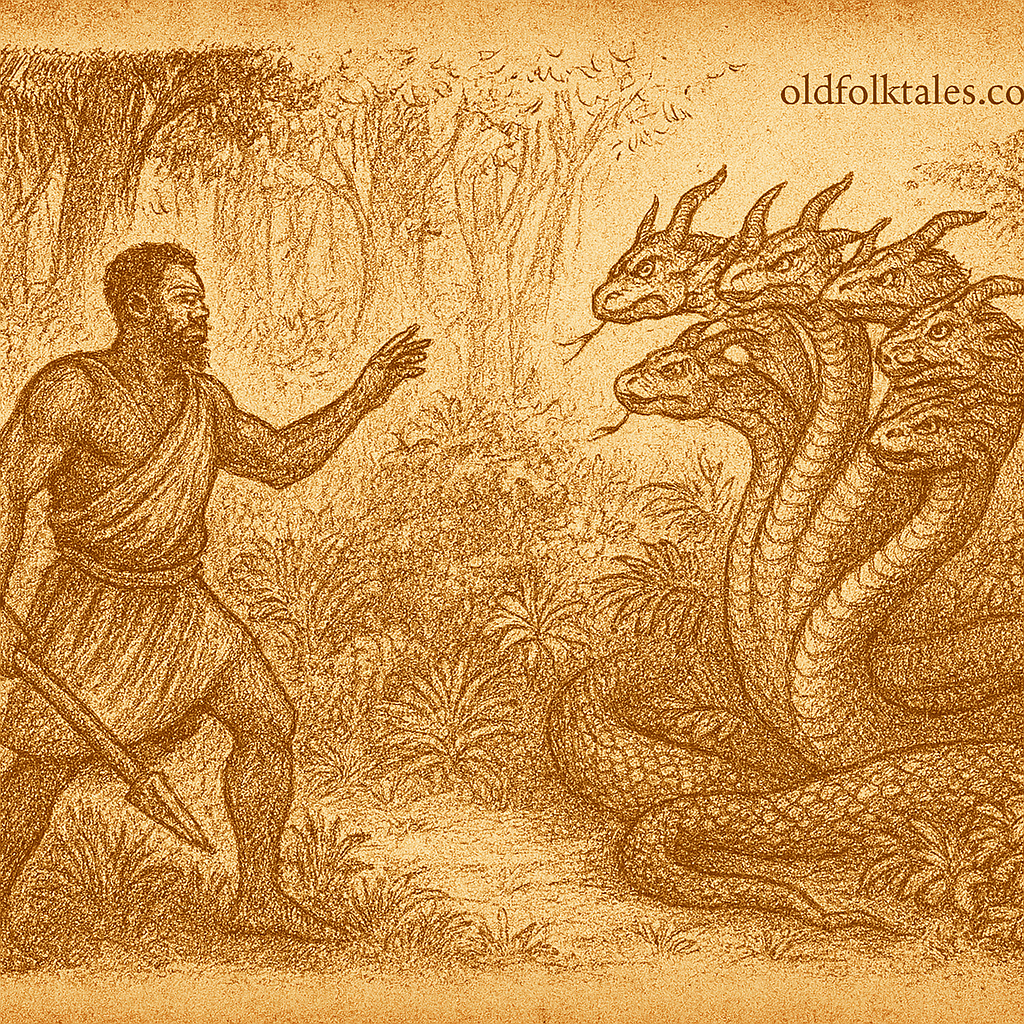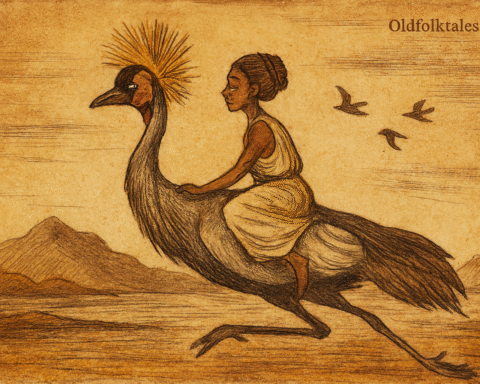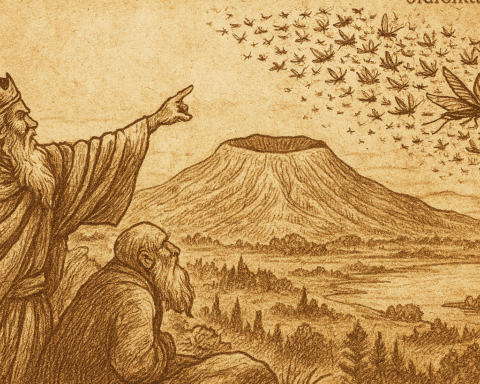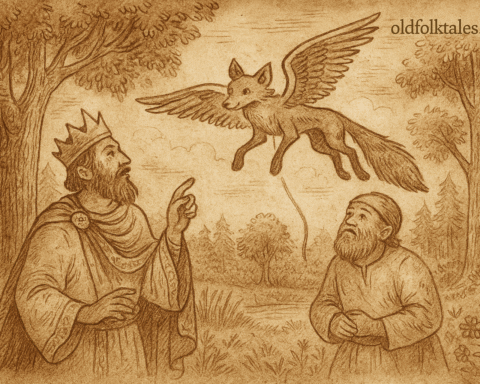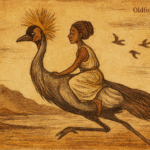In the heart of ancient Uganda, where rolling hills stretched toward distant horizons and villages nestled among banana groves, there lived a man named Kibate whose warm heart had earned him countless friends throughout the region. His generous spirit and kind nature made him beloved by all who knew him, and his laughter could often be heard echoing through the marketplace where neighbors gathered to share stories and trade goods.
The time had come for Kibate to build a home of his own, and with great excitement, he turned to his many friends for guidance. Each friend, eager to help and demonstrate their wisdom, offered passionate advice with the best of intentions. One insisted the house should face east to capture the morning sun’s warmth, while another argued for a western orientation to enjoy the cooling evening breezes. Some recommended building with sturdy timber from the ironwood trees, others swore by the flexibility of bamboo that could bend with the storms. The roof should be steep to shed the heavy rains, declared some voices; it should be gently sloped for beauty, countered others.
As the conflicting suggestions swirled around him like leaves caught in a whirlwind, Kibate found himself growing more bewildered by the day. He realized with dawning clarity that following everyone’s well-meaning counsel would result in a house so strange and contradictory it might collapse under the weight of its own confusion. Yet choosing to heed only some friends would surely wound the feelings of others, creating jealousy and resentment where once there had been only goodwill and harmony.
Also read: The Golden-Crested Crane
With a heavy but determined heart, Kibate made a decision that surprised everyone, including himself. “I shall build my house entirely alone,” he announced quietly, and without further explanation, he gathered his tools and disappeared into the dense jungle that bordered their community like a green wall of mystery.
Deep within the forest’s emerald embrace, Kibate discovered a perfect clearing where ancient trees formed a natural circle, their towering branches creating a cathedral of dappled sunlight and whispering leaves. Here, far from the overwhelming chorus of advice and expectation, he began the solitary work of creating his home. Day after day, week after week, he labored with his own hands, learning through patient trial and careful observation, discovering solutions through quiet experimentation and thoughtful reflection.
As the months passed like flowing seasons, something magical began to unfold. The isolation that might have driven another man to loneliness instead opened Kibate’s heart to unexpected companionships. The forest creatures, initially wary of this human intruder, gradually accepted his gentle presence and peaceful intentions. Birds would perch nearby as he worked, chattering in languages he slowly began to understand. Monkeys observed his progress with curious, intelligent eyes, and even the ancient trees seemed to whisper their approval as his beautiful house took shape beneath their protective canopy.
Through countless sunrises and sunsets, Kibate not only constructed his dwelling but discovered remarkable gifts within himself he never knew existed. He learned to speak with the animals in their own tongues, to understand the subtle moods of the trees, and to read the forest’s ancient wisdom written in rustling leaves and flowing streams.
When his magnificent home finally stood complete, Kibate’s heart swelled with both deep pride and genuine longing for human companionship. He prepared a sumptuous feast with foods gathered from the forest’s bounty and sent word to all his friends, inviting them to celebrate his extraordinary achievement. They came eagerly and joyfully, having wondered and worried about his long absence, some having feared he was lost forever to the jungle’s mysterious depths.
The celebration was filled with laughter, delicious food, and genuine admiration for Kibate’s remarkable craftsmanship. Friend after friend praised the house’s beauty, ingenuity, and perfect harmony with its forest surroundings, marveling at how it seemed to grow naturally from the earth itself. However, one particularly observant friend noticed a critical structural flaw that others had overlooked in their enthusiasm.
“Kibate,” he said with genuine concern, “you need one more support pole in the roof. Without it, I fear your beautiful house may eventually weaken and collapse.” He pointed precisely to where the additional support was needed, and Kibate immediately recognized the wisdom of this observation.
“You are absolutely right, my friend,” Kibate replied gratefully. “I’ll venture into the forest immediately to cut the perfect pole. Will you wait here until I return to help me install it properly?”
His friend nodded with a warm, reassuring smile. “I’ll sit right here until you come back, no matter how long it takes.”
Taking his sharp axe and reliable spear, Kibate ventured confidently into his beloved forest home. But as he approached the first suitable tree and raised his axe with practiced skill, an extraordinary thing happened that stopped him cold. The tree itself cried out in a voice filled with hurt and bewilderment, “Kibate, would you harm an old friend who has sheltered and protected you?”
Startled but immediately understanding, Kibate moved respectfully to another tree, only to hear the same plaintive, heartbroken plea: “Do not hurt me, Kibate; are we not dear friends who have shared so many peaceful days together?” Tree after mighty tree spoke to him with voices of friendship, trust, and genuine affection, each one reminding him of the deep bonds they had formed during his months of solitary building and quiet communion with nature.
As Kibate wandered deeper and deeper into the forest, searching desperately for a tree that wouldn’t speak to him as a beloved friend, exhaustion began to weigh heavily on his shoulders. Worse still, he realized with growing alarm and confusion that in his emotional turmoil and desperate searching, he had completely lost his way. The familiar paths had vanished as if by magic, and the jungle seemed to stretch endlessly in all directions, offering no recognizable landmarks or hope of easy return.
Sitting heavily on a moss-covered fallen log, Kibate pondered his seemingly impossible predicament when suddenly the dense undergrowth rustled with mysterious, purposeful movement. From the green shadows emerged the most extraordinary and magnificent creature he had ever beheld: a great serpent with seven distinct heads, each moving independently and regarding him with ancient, all-knowing eyes that seemed to hold the wisdom of countless ages.
Before Kibate could fully process this miraculous wonder, each head spoke to him in turn, their voices carrying the unmistakable weight and authority of divine prophecy:
“Kibate, the King will send for you.” “Kibate, you shall be a great chief.” “Kibate, you shall be a great warrior.” “Kibate, all Uganda shall hear of you.” “Kibate, the generations to come will praise you.” “Kibate, you shall make fire for the army.” “Kibate, you shall make a rhinoceros laugh.”
As mysteriously and silently as it had appeared, the seven-headed snake glided gracefully back into the jungle’s depths, leaving Kibate wondering in amazement whether this encounter had been gloriously real or merely a vivid dream born of exhaustion, wonder, and deep spiritual connection to the forest.
Remarkably, he found himself completely refreshed and clear-headed, as if the serpent’s presence had restored his strength and purpose. Standing with renewed energy, he quickly discovered a clear path that led him out of the forest and onto a main road bustling with urgent travelers moving with determined purpose.
When he inquired about their hurried journeys, a passing man explained breathlessly, “The King of Uganda is marching to war against the King of Ankole, and every able-bodied man must join the royal army immediately or face severe punishment for cowardice and disloyalty.”
Without hesitation or fear, Kibate shouldered his trusted weapons and joined the steady stream of soldiers heading toward the distant battlefield. For many long days they marched across Uganda’s varied landscapes through green valleys, over rocky hills, and across flowing rivers until they finally reached the contested borderlands of Ankole, where they established a vast military encampment on a wide, strategic plain.
Their first night in enemy territory brought unexpected disaster in the form of a ferocious storm that raged mercilessly for three days and nights without pause or relief. Torrential rain pounded their temporary shelters relentlessly, soaking every tent, every supply, every hope of comfort or warmth. When the storm finally exhausted its fury, the weary, shivering soldiers discovered to their dismay that every single fire in the entire camp had been completely extinguished, leaving them cold, miserable, and unable to cook their meager rations or warm their chilled bodies.
As the desperate men huddled together in damp misery, contemplating a night of raw food and bitter cold, the camp chief spotted a mysterious, flickering light dancing on a distant hilltop. Immediately, he roused a company of his strongest and most reliable men, ordering them to climb that treacherous hill through the darkness and return with precious fire to save the suffering army from cold and hunger.
The brave soldiers set out eagerly across the muddy plain, but what they discovered on the hilltop defied all expectation and reason. The fire burned not in any earthly hearth or natural source, but mysteriously upon the single horn of a massive rhinoceros who stood alone on the summit, gazing out over the dark landscape with an expression of profound melancholy and bone-deep boredom.
When the soldiers approached respectfully and humbly requested some of his magical fire, the great rhinoceros replied with a weary, lonely sigh that seemed to echo across the entire plain: “Life is terribly dull and empty up here on this isolated hilltop, with no companionship or entertainment to break the endless monotony. I’ll share my precious fire only with someone clever enough to tell me a truly funny story that can make me laugh and forget my solitude.”
The soldiers wracked their brains desperately, thinking of every joke, amusing tale, and funny incident they had ever heard or experienced, but none could think of anything that seemed remotely entertaining enough to satisfy a lonely, bored rhinoceros with magical fire on his horn. Defeated and empty-handed, they trudged back to camp through the mud, reporting their strange, impossible encounter to their increasingly desperate commanding chief.
The chief, facing the prospect of his entire army freezing and starving, immediately proclaimed throughout the military camp that whoever could successfully make the rhinoceros laugh and return with life-saving fire would be granted a prestigious chieftainship when the war concluded victoriously.
Upon hearing this extraordinary challenge and remembering the seven-headed serpent’s mysterious prophecy, Kibate volunteered immediately and confidently, drawing upon the unique wisdom and understanding he had gained during his transformative months among the forest creatures and their strange ways of thinking.
Climbing the dark hill alone with quiet determination, Kibate found the massive rhinoceros exactly as the soldiers had described—gazing gloomily across the moonlit plain, radiating such profound boredom and melancholy that even the stars seemed dimmer above his lonely vigil. Without hesitation or preamble, understanding exactly what this lonely creature needed, Kibate launched into his carefully chosen tale:
“Once upon a time, in a kingdom far from here, there lived a King who was born without any feet whatsoever.”
The rhinoceros’s great ears perked up immediately with genuine interest and curiosity. “Really? How fascinating! What did this remarkable footless King do to get around his kingdom?”
“Why, he walked everywhere on his hands, of course!” Kibate replied with perfect matter-of-fact delivery.
The effect was instantaneous, spectacular, and deeply satisfying. The enormous rhinoceros burst into such thunderous, wholehearted laughter that his entire massive body shook with pure joy, causing the magical fire on his horn to dance and flicker wildly in rhythm with his mirth. While the great beast continued laughing until his sides ached with delicious pain, Kibate carefully and skillfully transferred the precious flames to his fire pot, nurturing them into a healthy, steady blaze that would warm and feed the entire army.
As he descended the hill triumphantly with his life-saving treasure, Kibate could still hear the rhinoceros laughing with uninhibited delight on his hilltop, finally freed from the crushing weight of loneliness and boredom. Perhaps others might not find the story quite so hilarious, but Kibate’s months of communion with forest creatures had taught him exactly what would amuse a solitary rhinoceros and touch his simple, lonely heart.
Returning to camp like a conquering hero, Kibate shared the precious fire with his grateful comrades, who quickly kindled cooking fires throughout the encampment. Warm, well-fed, and filled with renewed hope and energy, the soldiers fought magnificently the following day, achieving a decisive and celebrated victory over the King of Ankole’s forces.
True to his royal word and recognizing genuine merit when he saw it, the King summoned Kibate after the triumphant war and elevated him to chieftain rank with appropriate ceremony and honor. As the victorious army dispersed joyfully to their distant homes, they carried with them the inspiring tale of Kibate’s heroic deed, spreading his fame and reputation throughout every corner of Uganda just as the seven-headed serpent had prophesied.
But Kibate’s very first destination was his beloved jungle home, where an astonishing and touching sight awaited his return. There, sitting in exactly the same spot where Kibate had left him many months before, was his faithful friend—but the man had aged dramatically and remarkably, his once-dark hair now completely white and his face deeply lined with the wisdom-wrinkles that come only from long, deep contemplation.
“My dear, loyal friend,” Kibate exclaimed in genuine amazement and concern, “you’ve grown so very old during my absence!”
His friend nodded slowly with a gentle, knowing smile full of patience and understanding. “I have been sitting here thinking continuously all this time, pondering the mysteries of life and friendship, and deep thinking always makes people age very quickly indeed.”
The Moral Lesson
This profound Ugandan tale teaches us that sometimes we must trust our own judgment and forge our own path, even when well-meaning friends offer conflicting advice. Kibate’s willingness to work in solitude led him to discover inner wisdom, unique abilities, and a deep connection with nature he never knew he possessed. The story emphasizes that true friendship involves patience, loyalty, and selfless waiting, while also showing how individual growth through solitary reflection can ultimately benefit the entire community.
Knowledge Check
Q1: Why did Kibate choose to build his house alone in the jungle rather than follow his friends’ advice? A1: Kibate realized that the conflicting advice from his many friends would create a strange, impractical house, while choosing only some friends’ suggestions would cause jealousy and hurt feelings among the others he ignored.
Q2: What extraordinary abilities did Kibate develop during his solitary months in the forest? A2: While building his house alone, Kibate learned to communicate with forest animals, understand the language of trees, and developed a deep spiritual connection with nature that would later help him in his military adventures.
Q3: What seven prophecies did the mystical serpent make about Kibate’s future destiny? A3: The seven-headed snake predicted that Kibate would be summoned by the King, become a great chief and warrior, be known throughout Uganda, be praised by future generations, make fire for the army, and make a rhinoceros laugh.
Q4: How did Kibate’s unique forest experience help him solve the army’s fire crisis? A4: Kibate’s months of learning animal psychology and communication allowed him to understand exactly what would amuse the lonely rhinoceros a simple, absurd story about a footless king who walked on his hands.
Q5: What does Kibate’s patient friend represent in this traditional Ugandan folktale? A5: The friend who waited faithfully and aged from deep thinking represents unwavering loyalty, the transformative power of contemplation, and perhaps the cost of staying static while others grow through new experiences and challenges.
Q6: What cultural values about individual growth and community responsibility does this Ugandan story emphasize? A6: The folktale emphasizes the balance between following community advice and trusting personal judgment, the importance of learning from nature, and how individual wisdom gained through solitude can ultimately serve and benefit the entire community.
Source: Traditional Ugandan folktale from “The King of the Snakes, And Other Folk-Lore Stories from Uganda”
